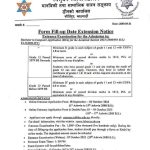-
Table of Contents
BSc.CSIT College
Today, every BSc.CSIT College Student, regardless of his or her area of specialization, must have a solid foundation in the theory and principles of information technology. There are several reasons for this to start up BSc.CSIT Colleges in Kathmandu. First, in an information-based society, the primary output of organizational workers consists of information and knowledge.
As the complexity and sophistication of managing businesses increase, global and international economic pressures mount, and technology becomes intricately woven into the fabric of the business. So, knowledge of computers and information systems is becoming essential. That’s why many BSc.CSIT Colleges in Nepal has started BSc.CSIT courses in Bhaktapur, Kathmandu, Nepal to meet the global needs of today’s market.
Bachelor of Science in Computer Science and Information Technology (BSc. CSIT) has been developed with a motive to provide the students with adequate knowledge in theoretical, practical, and technical aspects to meet the ever-growing manpower requirement in the field of Information Technology.
Our Next Program: BCA Course in Nepal
BSc.CSIT Course Structure is a four-year (eight-semester) degree program offered by the Institute of Science and Technology, Tribhuvan University. The BSc.CSIT Program in Nepal comprises core computer courses, elective natural science and computer science courses, mathematics courses, and other supporting courses of 126 hours. In addition to the core computer science and several elective IT courses, the program offers several projects and internships.
The BSc.CSIT Course in Kathmandu develops the underlying principles of both computer science and information technology including design, theory, programming, and application of computer systems and shows how these principles can be applied to solve real-world problems. Students looking for top BSc. CSIT colleges in Bhaktapur, Kathmandu Valley, and all over Nepal usually join Samriddhi College.

Career after BSc. CSIT Course in Nepal
Samriddhi College is one of the best BSc. CSIT college in Bhaktapur, Kathmandu Valley, and all over Nepal. After the completion of BSc. CSIT Colleges in Kathmandu, the graduates have opportunities to build careers at different government and non-government institutions, software and computer networking companies, private and public organizations as IT experts, and more industries wherever there is a need for computer science and information technology professionals.
IT graduates at Samriddhi College can join in various IT job positions like researcher, software architect, system analyst, system administrator, software programmer, database administrator, network administrator, graphics designer, web designer, IT manager, IT security engineer, IT project manager, IT consultant, etc. in Nepal as well as in abroad. The BSc.CSIT graduates students can also start their career as IT entrepreneurs or they can pursue higher academic degrees in national or abroad universities around the world, that why Samriddhi college is the best IT College of Nepal.
Our Next Progam: BBS Course in Nepal
The Career objective of the BSc.CSIT Course
The main aim of a B.Sc. (CSIT) program is:
- To provide students with intensive knowledge and skill in different areas of computer science and information technology including design, theory, programming, and application of a computer system.
- To provide necessary knowledge in the field of functional knowledge of the hardware systems and the necessary knowledge of the computer software systems.
Course Features at Samriddhi College
- Free Extra professional courses from the first semester
- Hardware Training
- Web Development (HTML, PHP, JavaScript)
- CCNA
- Python with Data Science
- Android
- And many more
- Guest Lecture sessions from experts
- Workshop and seminar by professionals
- Free Books for Students
- Excellent Academic Results
- Well experienced faculty members
- Merit-based scholarships in internal and final examinations
- Promoting entrepreneurs through “Incubation Center” and “Skill Lab”
- Job placement through “Placement Cell”
- Different skill sets training students through Project-based Learning
Eligibility Criteria for BSc.CSIT Admission
A student who seeks admission to B.Sc. CSIT program:
- Should have successfully completed twelve years of schooling in the science stream or equivalent from any university, board, or institution.
- Should have secured a minimum of the second division.
- Should have successfully passed the entrance examination conducted by the Institute of Science and Technology (IOST), TU.
- Complied with all the application procedures.
To know more information about B.Sc.CSIT entrance exam syllabus of Nepal, please go to the BScCSIT entrance exam syllabus
-
BSc.CSIT Course Duration
The entire BSc.CSIT course is of eight semesters (four academic years). There is a separate semester examination after the end of each semester.
-
Hours of Instruction
- Working days: 90 days in a semester
- Class hours:
- 3 credit hour courses with theory and lab are equivalent to 3 hours theory and 3 hours lab = 6working hours per week.
- 3 credit hours theory-only course is equivalent 3 hours theory and 2 hours tutorial = 5working hours per week.
-
Evaluation
Theory course should have an internal weightage of 20% and external weightage of 80%. For the course of having lab work, the internal weightage is 20%, lab work weightage is 20% and external weightage is 60%. A student should secure a minimum of 40% in each category to pass a course. The final score in each course will be the sum of overall weightage of in all categories. There will be a separate practical examination for the 20% weightage of lab work conducted by the concerned college in the presence of an external examiner.
The project work and internship are evaluated by different evaluators. To pass project work and internship, students should secure at least 40% marks in the evaluation of each evaluator and the final score will be the sum of all the evaluations. For the evaluation of the final presentation, an external examiner will be assigned from the IOST.
-
The Grading System
A student having passed his/her 8 semesters (4 years) of study will be graded as follows:
- Distinction: 80 % and above (8 semester’s average)
- First Division: 70 % and above (8 semester’s average)
- Second Division: 55 % and above (8 semester’s average)
- Pass Division: 40% and above (8 semester’s average)
Attendance Requirement:
Students are required to attend regularly all theory and practical classes and should maintain 80 per cent attendance in each course separately.
Final Examination:
Institute of science and technology, Tribhuvan University, will conduct the final examination at the end of each semester. 80% weightage will be given to the final examination for theory course and 60% will be given for the course having both theory and practical.
-
BSc.CSIT Curriculum Structure
The B. Sc. (CSIT program will have eight semesters with 126 credit hours. Each semester shall have a duration of 6 months. This program comprises of the following courses:
S.N.
Courses
Credit Hour
1.
Computer science core courses
75 credit hours
2.
Natural science elective courses
6 credit hours
3.
Mathematics courses
12 credit hours
4.
English courses
3 credit hours
5.
Social science and management
6 credit hours
6.
Computer science elective courses
15 credit hours
7.
Internship/Project
9 credit hours
Total Credit hours
126 credit hours
BSc. CSIT Course Structure (New)
-
First Semester
Course Code
Course Title
Credit Hours
Full Marks
CSC109
Introduction to Information Technology
3
100
CSC110
C Programming
3
100
CSC111
Digital Logic
3
100
MTH112
Mathematics I
3
100
PHY113
Physics
3
100
Total
15
500
-
Second Semester
Course Code
Course Title
Credit Hours
Full Marks
CSC160
Discrete Structure
3
100
CSC161
Object Oriented Programming
3
100
CSC162
Microprocessor
3
100
MTH163
Mathematics II
3
100
STA164
Statistics I
3
100
Total
15
500
-
Third Semester
Course Code
Course Title
Credit Hours
Full Marks
CSC206
Data Structure and Algorithms
3
100
CSC207
Numerical Method
3
100
CSC208
Computer Architecture
3
100
CSC209
Computer Graphics
3
100
STA210
Statistics II
3
100
Total
15
500
-
Fourth Semester
Course Code
Course Title
Credit Hours
Full Marks
CSC257
Theory of Computation
3
100
CSC258
Computer Networks
3
100
CSC259
Operating Systems
3
100
CSC260
Database Management System
3
100
CSC261
Artificial Intelligence
3
100
Total
15
500
-
Fifth Semester
Course Code
Course Title
Credit Hours
Full Marks
CSC314
Design and Analysis of Algorithms
3
100
CSC315
System Analysis and Design
3
100
CSC316
Cryptography
3
100
CSC317
Simulation and Modeling
3
100
CSC318
Web Technology
3
100
Elective I
3
100
Total
18
600
List of Electives:
- Multimedia Computing (CSC319)
- Wireless Networking (CSC320)
- Image Processing (CSC321)
- Knowledge Management (CSC322)
- Society and Ethics in Information Technology (CSC323)
- Microprocessor Based Design (CSC324)
-
Sixth Semester
Course Code
Course Title
Credit Hours
Full Marks
CSC364
Software Engineering
3
100
CSC365
Compiler Design and Construction
3
100
CSC366
E-Governance
3
100
CSC367
NET Centric Computing
3
100
CSC368
Technical Writing
3
100
Elective II
3
100
Total
18
600
List of Electives:
- Applied Logic(CSC369)
- E-commerce (CSC370)
- Automation and Robotics (CSC371)
- Neural Networks (CSC372)
- Computer Hardware Design (CSC373)
- Cognitive Science (CSC374)
-
Seventh Semester
Course Code
Course Title
Credit Hours
Full Marks
CSC409
Advanced Java Programming
3
100
CSC410
Data Warehousing and Data Mining
3
100
MGT411
Principles of Management
3
100
CSC412
Project Work
3
100
Elective III
3
100
Total
15
500
List of Electives:
- Information Retrieval (CSC413)
- Database Administration (CSC414)
- Software Project Management (CSC415)
- Network Security (CSC416)
- Digital System Design (CSC417)
- International Marketing (MGT418)
-
Eighth Semester
Course Code
Course Title
Credit Hours
Full Marks
CSC461
Advanced Database
3
100
CSC462
Internship
6
200
Elective IV
3
100
Elective V
3
100
Total
15
500
List of Electives:
- Advanced Networking with IPV6 (CSC463)
- Distributed Networking (CSC464)
- Game Technology (CSC465)
- Distributed and Object Oriented Database (CSC466)
- Introduction to Cloud Computing (CSC467)
- Geographical Information System(CSC468)
- Decision Support System and Expert System (CSC469)
- Mobile Application Development (CSC470)
- Real Time Systems (CSC471)
- Network and System Administration (CSC472)
- Embedded Systems Programming (CSC473)
- International Business Management (MGT474)

 Location:
Location:



